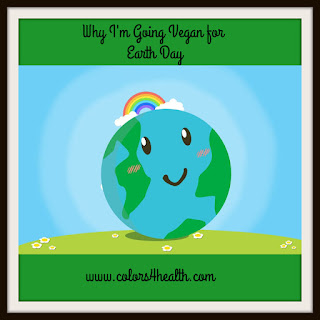Updated 3/27/23
My tip is to make a commitment to reuse, recycle, reduce, and repair, remake, refuse, remember, respect, and restore to live more sustainably.
A special way I pledge to honor the earth is to reduce my carbon footprint even more than I have in the past. My grandson Noah has graciously agreed to guest blog for me. I am thrilled and delighted to share it.
Thanks so much for taking the time to read my guest blog. My name is Noah White and I am one of Nancy’s very lucky grandchildren.
In 2018, I graduated from Duke University with a degree in Environmental Science and Policy and I am now living in Oakland, CA where I hold a Master's Degree in Sustainable Solutions from the University of CA, Berkley
When asked, I tell people that I am a “flexitarian.” Why? Because there’s simply no denying the environmental impact that raising animals for livestock has on the environment and as such, I feel obligated to minimize my consumption of animal products.
However, realistically, I love going out for Pizza with friends or eating a roast chicken prepared by a loved one, so I stay flexible.
What kind of environmental impacts am I referring to? Well, lots actually. According to a report published by the United Nations Food and Agriculture Organization, the livestock sector generates more greenhouse gas emissions as measured in CO2 equivalent – 18 percent – than transport. Yes. You read that right. If you went vegan, you would conserve more carbon emissions than if you gave up motorized transport entirely.
Greenhouse gas emissions aside, the land use impacts are hard to believe.
In fact, thirty percent of the earth’s entire land surface—a massive 70% of all agricultural land—is used for rearing farmed animals.
Think of it this way. A third or 33% of the world’s lands suitable for growing crops and directly feeding humans, is used to produce feed for farmed animals and raise livestock.
Our overcrowded and infection-susceptible cities might just be a lot more resilient if we weren’t using so much land for livestock.
With this massive impact in mind, I won’t use any animal products on Earth Day. And while this impact may be disheartening, I find it comforting to think that consuming less meat and animal products has such a large impact in helping the environment!
So, what will I be cooking? Well, breakfast will be sweet and rich in the form of hazelnut pancakes, using oat milk and hazelnut flour for an added twist.
I plan on spending Earth Day isolated, in the sunshine, surrounded by greenery, breathing in lots of fresh air.
However, when I stop for lunch, I’ll probably enjoy one of my go-to snacks. It's a hummus, cucumber, and avocado wrap; so simple, yet so delish. And while I normally enjoy cheese on this wrap, I’ll either forgo it or use some vegan cheese slices.
At the end of the day, I’ll probably sit
down to watch an episode of Planet Earth, with David Attenborough’s silky-smooth
voice describing the marvelous natural splendor of our planet.
For dinner I’ll be chowing down vegan Primavera sauce on homemade noodles I make with my newest favorite culinary device, a pasta maker.
👌
Please comment below and share on social media with a link back to this post. I appreciate your comments and read every one.
In what ways can you treat the environment better this year?
Are you willing to eat more plant-based meals? What ideas do you have for accomplishing that?
From all reports the COVID-19 Pandemic has keep most of us home. It's reduced air pollution, by cutting down the usage of fossil fuel motorized vehicles.
Can you image how healthy the planet, people, and animals would be, if we ate more plants and less animal products? After all, the livestock sector generates more greenhouse gas emissions as measured in CO2 equivalent – 18 percent – than transport.
My tip is to make a commitment to reuse, recycle, reduce, and repair, remake, refuse, remember, respect, and restore to live more sustainably.
A special way I pledge to honor the earth is to reduce my carbon footprint even more than I have in the past. My grandson Noah has graciously agreed to guest blog for me. I am thrilled and delighted to share it.
Here's his post now.
Thanks so much for taking the time to read my guest blog. My name is Noah White and I am one of Nancy’s very lucky grandchildren.
In 2018, I graduated from Duke University with a degree in Environmental Science and Policy and I am now living in Oakland, CA where I hold a Master's Degree in Sustainable Solutions from the University of CA, Berkley
While
I’ll be going especially vegan for this upcoming Earth Day, it’s actually not
the first time I’ve eaten on a strict vegan diet.
In 2012, when I was training as a competitive runner, I read Scott Jurek’s Eat and Run: My Unlikely Journey to Ultramarathon Greatness. Scott, a highly accomplished runner, explained how he made a transition to a vegan diet that improved his overall health and well-being.
My stint at veganism only lasted for a month in 2012. I've transitioned to a more plant focused eating plan since then.
In 2012, when I was training as a competitive runner, I read Scott Jurek’s Eat and Run: My Unlikely Journey to Ultramarathon Greatness. Scott, a highly accomplished runner, explained how he made a transition to a vegan diet that improved his overall health and well-being.
My stint at veganism only lasted for a month in 2012. I've transitioned to a more plant focused eating plan since then.
When asked, I tell people that I am a “flexitarian.” Why? Because there’s simply no denying the environmental impact that raising animals for livestock has on the environment and as such, I feel obligated to minimize my consumption of animal products.
However, realistically, I love going out for Pizza with friends or eating a roast chicken prepared by a loved one, so I stay flexible.
What kind of environmental impacts am I referring to? Well, lots actually. According to a report published by the United Nations Food and Agriculture Organization, the livestock sector generates more greenhouse gas emissions as measured in CO2 equivalent – 18 percent – than transport. Yes. You read that right. If you went vegan, you would conserve more carbon emissions than if you gave up motorized transport entirely.
Greenhouse gas emissions aside, the land use impacts are hard to believe.
In fact, thirty percent of the earth’s entire land surface—a massive 70% of all agricultural land—is used for rearing farmed animals.
Think of it this way. A third or 33% of the world’s lands suitable for growing crops and directly feeding humans, is used to produce feed for farmed animals and raise livestock.
Our overcrowded and infection-susceptible cities might just be a lot more resilient if we weren’t using so much land for livestock.
With this massive impact in mind, I won’t use any animal products on Earth Day. And while this impact may be disheartening, I find it comforting to think that consuming less meat and animal products has such a large impact in helping the environment!
So, what will I be cooking? Well, breakfast will be sweet and rich in the form of hazelnut pancakes, using oat milk and hazelnut flour for an added twist.
I plan on spending Earth Day isolated, in the sunshine, surrounded by greenery, breathing in lots of fresh air.
However, when I stop for lunch, I’ll probably enjoy one of my go-to snacks. It's a hummus, cucumber, and avocado wrap; so simple, yet so delish. And while I normally enjoy cheese on this wrap, I’ll either forgo it or use some vegan cheese slices.
For dinner I’ll be chowing down vegan Primavera sauce on homemade noodles I make with my newest favorite culinary device, a pasta maker.
Happy Earth
Day! And remember, a bit fewer animal products can really have a large positive
impact for our global community.
🍄🍅🌿🍆🍝
More Earth Friendly Ideas to Enhance Health and Happiness
More Earth Friendly Ideas to Enhance Health and Happiness
 |
| Vegan Hummus Wrap, Photo from Ahead of Time |
In what ways can you treat the environment better this year?
Are you willing to eat more plant-based meals? What ideas do you have for accomplishing that?
From all reports the COVID-19 Pandemic has keep most of us home. It's reduced air pollution, by cutting down the usage of fossil fuel motorized vehicles.
Can you image how healthy the planet, people, and animals would be, if we ate more plants and less animal products? After all, the livestock sector generates more greenhouse gas emissions as measured in CO2 equivalent – 18 percent – than transport.
Stay Safe, Be Well, and Go Vegan for Earth Day!
This post has been shared at Beth Fish Reads Weekend Cooking
This post has been shared at #TFT
This post has been shared at midlife-share-love-party-112
This post has been shared at Little Things Thursday hosted by Tamar of Random-osity
This post has been shared at #TFT
This post has been shared at midlife-share-love-party-112
This post has been shared at Little Things Thursday hosted by Tamar of Random-osity











